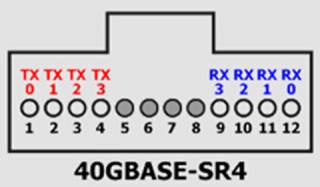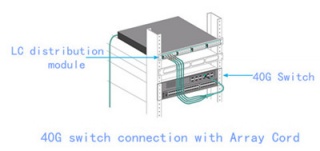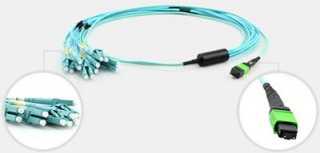Introduction to HPE 40G Optics
ponedjeljak , 26.09.2016.Recently the increasing network infrastructures are upgrading to 40GbE to ensure better performance, which greatly promote the popularity of 40G optical devices, especially the 40G optical transceivers and 40G QSFP+ cables. 40G optics, featured by its unique specification, are designed to meet different connectivity applications in data center. Telecom vendors like HPE, Cisco, Juniper, Arista are offering all types of 40G optics to meet the market needs, of which 40G optics form HPE are the commonly used products on the market. This article will have a short introduction to the HPE 40G modules and DAC cables.
Shedding Light on HPE 40G QSFP+ Modules
The 40G QSFP+ module is a compact, hot-pluggable transceiver used for data communications applications. It supports Serial Attached SCSI, 40G Ethernet, QDR (40G) and FDR (56G) Infiniband and other communications standards. Compared with SFP+ modules, QSFP+ transceiver increases the port-density of 3-4 times. The following part will mainly introduce three different types—40G LR4 QSFP+ transceiver, 40G SR4 QSFP+ transceiver and 40G CSR4 QSFP+ transceiver. Figure 1 shows a QSFP+ modules plugging into a HPE switch.
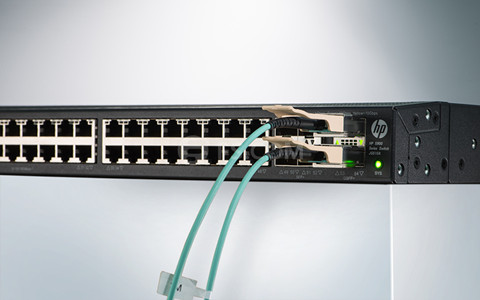
- HP 40GBASE-LR4 QSFP+ Transceiver
The 40G LR4 QSFP+ transceiver enables high-speed 4x10G operations and can be interoperability with 10GBASE-LR interfaces. Together with the LC connector, it can support an optical link length up to 10 kilometers over single-mode fiber. 40G QSFP+ cable is compliant with QSFP+ MSA and IEEE 802.3ba. In order to realize the function of transmitting 4-channel signals over single-mode fiber, this transceiver has to introduce MUX/DEMUX to multiplex/de-multiplex optical signals.
- HP 40GBASE-SR4 QSFP+ Transceiver
The 40G SR4 QSFP+ transceiver compatible with the 802.3ba 40GBASE-SR4 standard, provides a 40G optical connection using MPO/MTP fiber ribbon connectors. Unlike the 40G LR4 QSFP+ transceiver, this transceiver are used together with multimode fiber, supporting with a link length up to 100 meters on OM3 cable and 150 meters on OM4 cable. Take HPE JG325B as an example, it supports link lengths of 100m and 150m, respectively on OM3 and OM4 multimode fiber at a wavelength of 850nm. It primarily enables high-bandwidth 40G optical links over 12-fiber parallel fiber terminated with MPO/MTP multifiber connectors and can also be used in a 4x10G module for interoperability with 10GBASE-SR interfaces.
- HP 40GBASE-CSR4 QSFP+ Transceiver
40GBASE-CSR4 QSFP extends the reach of IEEE 40GBASE-SR4 interface to 300 and 400 meters on laser-optimized OM3 and OM4 multimode parallel fiber, respectively. Each 10-gigabit lane of this module is compliant to IEEE 10GBASE-SR specifications. This module can be used for native 40G optical links over 12-fiber parallel cables with MPO/MTP female connectors or in a 4x10G mode with parallel to duplex fiber breakout cables for connectivity to four 10GBASE-SR interfaces.
Features of 40G HP QSFP+ Modules
- Hot-pluggable input/output device that plugs into a 40 Gigabit Ethernet QSFP port
- High-speed electrical interface compliant to the IEEE 802.3ba standard
- Certified and tested on QSFP 40G ports for superior performance, quality, and reliability
- Digital Diagnostics Monitoring Interface
In addition, QSFP+ modules provide 40Gb/s Ethernet data rates over MMF optic cable and SMF optic cable. QSFP+ modules taking up very little space on a switch or server interface, allowing vendors to provide multiple QSFP+ ports in the same space. Besides the QSFP+ transceivers, HPE also offers QSFP+ cables for interconnection, which will be introduced in the next part.
HP 40GbE QSFP+ Cables
HPE offers a variety of 40GbE optical devices, such as QSFP to Four SFP+ copper breakout cables, QSFP to Four SFP+ active optical breakout cables, QSFP to QSFP active optical cables, etc. Each has its unique characteristics. Take HPE QSFP+ breakout cable as an example, compatible HPE JG330A (QSFP+ to 4SFP+ Passive Copper Cable) is very suitable for short distances and offer a very cost-effective way to establish a 40-gigabit link between QSFP port and SFP+ port of HPE switches within racks and across adjacent racks.
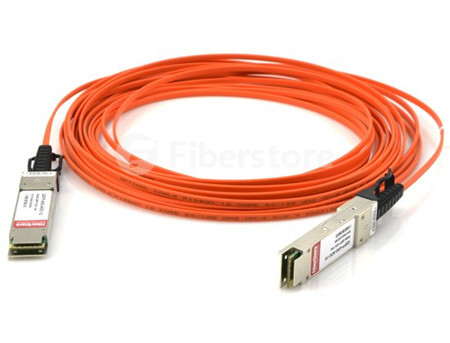
HPE QSFP+ to QSFP+ active optical cables are suitable for 40G Ethernet. And there are two common active optical cables available on the market—QSFP to 4 SFP+ breakout AOC and QSFP to QSFP AOC (see in the above image). QSFP to 4 SFP+ breakout AOC is a 4×10 Gb/s parallel active optical cable that transmits four separate streams of 10 Gb/s data over ribbon cables in a point-to-multipoint configuration. This cable contains a QSFP+ module on one end and four separate SFP+ modules at the other ends. The latter is a 40 Gb/s parallel active optical cable which transmits error-free parallel 4×10 Gb/s data over multimode fiber (MMF) ribbon cables.
Choose Compatible HPE Transceiver Modules
The first factor that forces people to choose third-party transceiver modules other than original modules is budget. Because the price of the original products is usually three or four times higher than 3-rd party devices. Designers can’t afford it. In addition, the third-party transceiver modules offered by reliable vendors are guaranteed to be well-tested and fully compatible with the major brand. It is feasible to buy compatible HPE transceivers from reliable OEM vendors. For example, FS.COM is devoted to design, manufacture, and sell a broad portfolio of optical products, including compatible HPE 40G QSFP+ transceivers. We supply high quality QSFP+ transceivers which are used primarily in switches, routers, and data center equipment.
Oznake: HPE 40G Optics, 40GbE, 40G QSFP
komentiraj (0) * ispiši * #
40G QSFP+: Data Center Bandwidth Provider
petak , 05.08.2016.With time passing by, the world’s data centers witness the rapid flowing of digital information whose volume grows at an ever increasing rate. The increase of server virtualization and cloud computing applications, coupled with the trend toward network convergence, all these are boosting today’s data center networks to become faster and more efficient than ever before. Date back to the past years, 100Mbps Ethernet is replaced by 1Gbps Ethernet which is then substituted by 10Gbps Ethernet. With 40GbE and 100GbE being available in the market, some companies or organizations can implement cut-through switching and flatter network architectures which can deliver more bandwidth, so as to reduce traffic latency and meet wireless computing needs.
To ensure the smooth 40GbE networking performance, one device is fundamental—40G QSFP+ (Quad Small Form-factor Pluggable Plus) transceiver. This QSFP+ transceiver interfaces a network device motherboard (for a switch, router, media converter or similar device) to a fiber optic cable, providing sufficient bandwidth to enable fully non-blocking switch fabrics.
40G QSFP+ Working Principlerinciple
40G QSFP+ transceiver is a hot-swappable module, integrating 4 independent 10Gbps data lanes in each direction for 40Gbps aggregated bandwidth. QSFP+ modules offer customers a wide variety of high-density 40Gbps connectivity options for data center, high-performance computing networks, enterprise core and distribution layers, and service provider transport applications. The release of the IEEE 802.3ba physical layer standard for 40G QSFP+ in 2010 specifies both fiber and copper cabling solutions, such as 40GBASE-SR4, 40GBASE-LR4 and 40GBASE-CR4.
40G QSFP+ Port typesrt types
Commonly used QSFP+ transceiver port types are 40GBASE-SR4 and 40GBASE-LR4.
40GBASE-SR4
40GBASE-SR4 physical medium dependent (PMD) variant defines a 4 lane parallel optical interconnect for operation up to 100m link length over OM3 multi-mode fiber (MMF) and to 150m over OM4 MMF. It establishes high-bandwidth 40G optical links over 12-fiber parallel fiber terminated with MPO/MTP multi-fiber female connectors. Four of the twelve fiber for receive, other four for transmit, leaving the middle four fiber unused. Each of the four lanes operates at a data rate of 10.3125Gbps which is the same serial bit rate that was defined for 10Gb Ethernet links in the IEEE 802.3ae standard ratified in 2002.
40GBASE-SR4 PMD addresses the modern need for 40Gbps interconnects in the data center and takes advantage of lower cost 850nm Vertical Cavity Surface Emitting Laser (VCSEL) technology that is widely deployed throughout networking industries. As each of the 4 lanes in 40GBASE-SR4 operates at the same serial bit rate as a 10Gb Ethernet link, there is an opportunity for switching hardware vendors to utilize 40GBASE-SR4 as 4 separate 10Gb Ethernet interconnects. The problem is that 40GBASE-SR4 standard is not defined to be backward compatible with the existing 10GbE short reach interconnect standard.
To address this issue, QSFP BiDi transceivers have been released into the market. A QSFP BiDi transceiver (e.g. Cisco QSFP-40G-SR-BD) transmits full-duplex 40-Gbps traffic over one dual-fiber LC-connector OM3 or OM4 MMF cable. It provides the capability to reuse 10-Gbps fiber infrastructure. In other words, it enables data center operators to upgrade to 40-Gbps connectivity without making any changes to the previous 10-Gbps fiber cable plant.
40GBASE-LR4
40GBASE-LR4 has two link options: coarse wavelength division multiplexing (CWDM) and parallel single-mode fiber (PSM). This passage mainly talks about the first one option.
40GBASE-LR4 CWDM QSFP+ uses a duplex LC connector as the optical interface, able to support transmission distance up to 10km over single-mode fiber (SMF). It converts 4 inputs channels of 10G electrical data to 4 CWDM optical signals by a driven 4-wavelength distributed feedback (DFB) laser array, and then multiplexes them into a single channel for 40G optical transmission, propagating out of the transmitter module from the SMF. Reversely, the receiver module accepts the 40G CWDM optical signals input, and demultiplexes it into 4 individual 10G channels with different wavelengths. The central wavelengths of the 4 CWDM channels are 1271, 1291, 1311 and 1331 nm as members of the CWDM wavelength grid defined in ITU-T G694.2. Each wavelength channel is collected by a discrete photo diode and output as electric data after being amplified by a transimpedance amplifier (TIA).
Cable Types for 40G QSFP+0G QSFP+
IEEE has specified standards for 40G transmission in both long distance and short distance, which are 40GBASE-SR4 and 40GBASE-LR4. As what has been mentioned above, the latter is suggested for 40G transmission over SMF in long distance up to 10km, while the former is for 40G transmission in short distance over MMF (often in with a 12-fiber MPO connector version)—OM3 (up to 100 meters) and OM4 (up to 150 meters). OM3 and OM4, which are usually aqua-colored, are accepted economic solutions for 40G in short distance with lower insertion loss and higher bandwidth. Besides, DACs are also chosen as the 40G cabling solutions sometimes, available in QSFP+ to QSFP+ DAC and QSFP to SFP+ cable versions.
Conclusionnclusion
40G QSFP+ transceivers support 40GBASE Ethernet, allowing flexibility of interface choice and great bandwidth for data centers. For your smooth 40GbE performance, Fiberstore supplies various cost-effective QSFP+ transceivers which are fully compatible with major brands, such as Cisco, Juniper, Brocade, and so on. Besides these 40G modules, SFP transceivers are also offered, like Cisco GLC-T, a Cisco compatible 1000BASE-T SFP. All these products are rigorously checked for quality and compatibility assurance. If you want such a module for your networking use, you can consider Fiberstore.
Oznake: 40GbE, 40G QSFP, 40GBASE-SR4, QSFP BiDi, Cisco QSFP-40G-SR-BD, sfp transceivers, Cisco GLC-T
komentiraj (0) * ispiši * #
Fan-out Technology Used in 40GbE Deployment
srijeda , 08.06.2016.Obvious is the growing need for bandwidth required to accommodate various cloud services, smooth multimedia downloads or uploads, video streaming, as well as growing wireless usage. 10Gbps links are not sufficient enough to handle the increased bandwidth. As such, it’s imperative to deploy Higher Speed Ethernet (HSE) network, say 40GbE, by using devices that scale to match customer demands. Besides adding more devices and cables, higher port density is also the ideal solution to get greater bandwidth. To deliver the higher HSE port density for 40GbE interfaces, fan-out (breakout or harness) cabling technology is introduced here which also meets the need to keep costs at a manageable level.
Fan-out Technology Basics
Being one of the latest enabling technologies to help increase port densities and lower costs, fan-out technology is easy to be grasped. At first sight, a fan-out cable looks very simple. It takes one (large bandwidth) physical interface and breaks it out into several (smaller bandwidth) interfaces. A typical example of this is QSFP to SFP+ cable assembly which takes one 40G QSFP interface on one end and uses a fan-out cable to break it into four SFP+ interfaces one the other end. In this QSFP+ assembly, a fan-out cable enables splitting out the 4 lanes into Tx/Tx pairs usable for 10GE transmissions.
However, the truth is not definitely just as its face. This complex fan-out technology is critically important in the distribution layer of 40G data center. The following passages discuss two fan-out assemblies that are widely used in 40G data center.
40G MPO/MTP Fan-out Cables
Here goes to the MPO/MTP fan-out cables in 40GbE transmission firstly. A MPO/MTP fanout cable is a multi-fiber optical cable that contains several individual tight buffered optical fibers with one end terminated with a male/female MPO connector and the other end usually terminated with several LC connectors. Existing 40Gbps transmission over this multi-mode backbones is accomplished by using an LC to MPO fan-out assembly to connect the existing LC connectors in the installed cabling to the MPO connector in the 40Gbps.
There are many MPO fan-out cable types. For 40G cabling, the most common breakout cable type is the one which is able to fan out into 12 fibers. (a typical 12-fiber MPO breakout cable often with OM3 optical fiber as the transmission media is shown below). This 12-fiber MPO fan-out cable is terminated with 6 duplex LC connectors on one end and a male MPO connector on the other end, which can work from MPO trunk backbone assemblies to LC fiber rack system in high density backbone cabling from 40G device to 10G devices.
40G Direct Attach Fan-out Cables
Direct attach cable (DAC), as a kind of optical transceiver assembly, is also available in fan-out design. It’s a form of high speed cable with “transceivers” on either end used to connect switches to routers or servers. Although the “transceivers” on both ends of DACs are not real optics and their components are without optical lasers, they perform the similar functions as the real transceivers. DAC fan-out cables can be divided into direct attach copper breakout cables and active optic fan-out cables.
Converting one form factor to a different form factor is necessary in many cases. For example, a 40G device may be connected to one or several 10G devices for distribution or adapting. With fan-out DAC, this process would be much easier. This pre-terminated components can also increase the reliability of data center effectively.
Fan-out Technology Consideration
One important consideration for fan-out technology is that for each group of fan-out ports, there must also be a MAC (media access control) engine and the entire IEEE reconciliation layers behind it. For example, a 40GE QSFP port in fan-out to 4x10GE links must have four individual 10GE MACs running behind each group of electrical lanes. The port electronics must be able to switch from a single 40GbE MAC to 4 10GbE MACs, and back again to a single 40GE MAC. This process is integral in assuring that the lanes have a correct and trackable MAC assignment -- it is crucial to make fan-out technology actually work.
Conclusion
40G fan-out technology separates a single physical interface into multiple physical interfaces that are 410GbE-capable, providing high-density interfaces over multiple speeds. This increases interface flexibility at lower costs. Fiberstore offers a wide selection of fan-out MPO and DAC cables (QSFP to SFP+ cable) for your 40G transmission. Besides these 40G cables, 40G modules which are fully compatible with major brands can also be found, such as Cisco QSFP-40G-SR-BD. This compatible module just costs you US$ 300.00 at Fiberstore, but when you search it on Amazon or somewhere else, it seems that you have to pay more than US$ 400.00 for a new one.
Oznake: 40GbE, fan-out cable, QSFP to SFP+ cable, MPO/MTP fan-out cables, DAC fan-out cables, 40G QSFP, Cisco QSFP-40G-SR-BD
komentiraj (0) * ispiši * #
